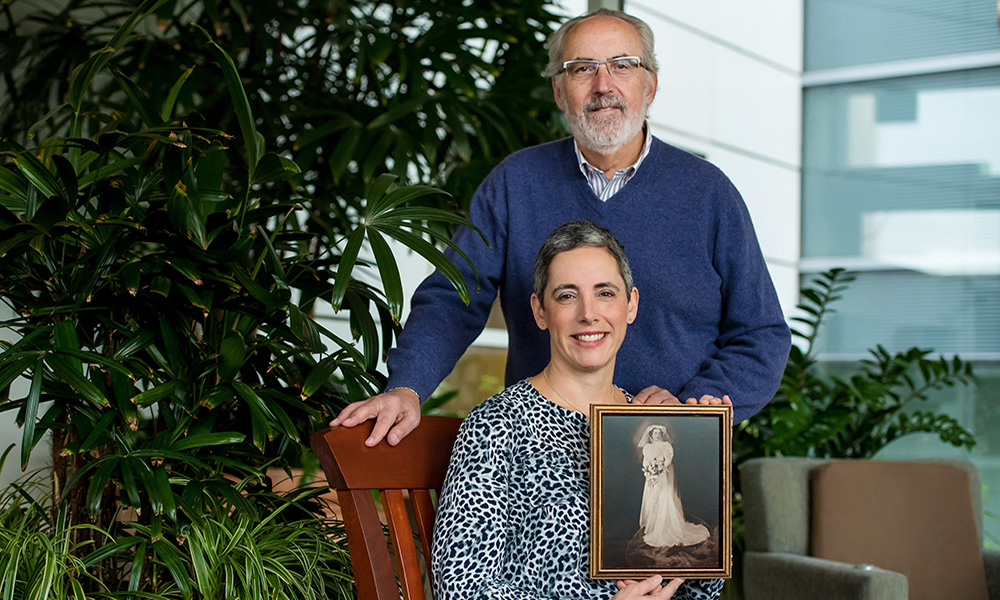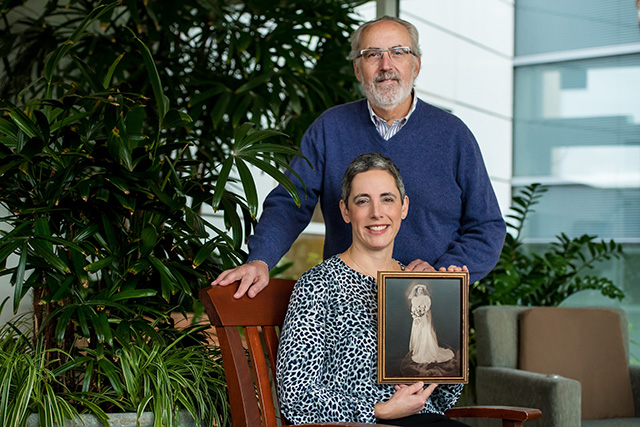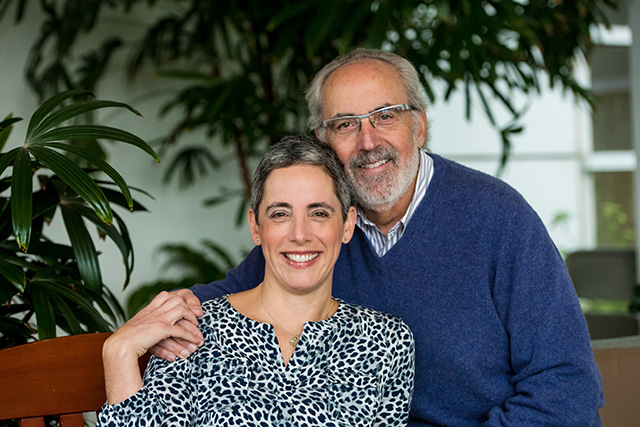Patient StoryMar | 23 | 2018
Lauren Corduck and Bob Cooperstein


The Cancer Center’s Story Project is an effort to capture stories from our community of patients, friends, family, clinicians, and staff who have been affected by cancer in some way. This is Lauren and Bob's Story.
- Lauren Corduck and her father Bob Cooperstein speak about how their lives have been impacted by having tested positive for a BRCA gene mutation.
- Lauren’s own experiences with cancer drove her to start Oneinforty, a non-profit organization aimed at educating Ashkenazi Jews, like herself and her father, of their heightened risk for testing positive for BRCA gene mutations, and the cancers they can cause.
- "The Cancer Center helped me make meaning out of this nightmare that happened and helped me find purpose around it through Oneinforty."
Lauren:
"My dad and I are both BRCA1 positive. I inherited the gene mutation from him, and his mother died of breast cancer, presumably caused by her BRCA gene mutation, at the age of 56, a month after I was born."
Bob:
"It’s clear that the BRCA gene mutation comes down from my mother’s side; my sister had breast cancer, and the mutation doesn’t skip generations."
Lauren:

"It only takes one parent to have a BRCA gene mutation for each of their biological children to have a 50% chance to have inherited that BRCA gene mutation. When you have a BRCA gene mutation, you’re at a much higher risk compared to the general population for developing male or female breast cancer, prostate cancer, and ovarian cancer, for which there is no annual screening. With all of that said, neither my dad or I, despite our strong family history of breast cancer (on my dad’s side) and our Ashkenazi Jewish heritage (meaning our ancestors are from eastern or central Europe), as 95% of U.S. Jews are, knew about this."
"Despite the fact we have this family history of breast cancer and we're Ashkenazi Jews, none of our primary care physicians had ever referred us to a genetic counselor for counseling and screening for the BRCA gene mutations. It was a friend of mine who about a year-and-a-half ago was going through her own breast cancer diagnosis, that let us know about the risk. She’s not Jewish, she’s not a medical professional, she was just educated about the high risk, the 1 in 40 risk to Ashkenazi Jews of inheriting the BRCA gene mutation. We’ve been friends since high school; she knows that I’m an Ashkenazi Jew with a family history of cancer and I’ve been terrified of developing breast cancer my entire life. I didn’t even know that my grandmother likely died of it."
"It’s very, very, low in the general population, very high in the Jewish population. My girlfriend said to me, 'you need to get tested. You need to seek genetic counseling and screening immediately.' On her prompting, last December I met with a genetic counselor. At the end of last year, New Year’s Eve, I found out after a simple blood test the genetic counselor had performed, I found that indeed I have the BRCA1 gene mutation."
"November of 2016 I started having excruciating, debilitating back pain. In December, not only did I meet with a genetic counselor for the BRCA counseling and screening on my friend’s urging, I also on my father’s urging had an MRI done of my back to get to the bottom of why I was having excruciating, debilitating back pain. I found out on December 31st of 2016, that I’m BRCA1 positive. I was preparing myself emotionally to have risk reducing surgery. I’m sure you’ve read all about what Angelina Jolie came forward with, not only did she have a prophylactic bilateral mastectomy, she’s BRCA1 positive like me, but she came forward a few years ago and said that she also had her ovaries and fallopian tubes removed to reduce her risk of developing ovarian cancer."
"Again, New Year’s Eve of last year, I’m devastated to learn that I have a BRCA1 gene mutation, I’m preparing myself to have my ovaries and fallopian tubes removed, which would have greatly reduced my risk of developing ovarian cancer. The results come back about a week after, early-January of 2017, that there was an incidental finding on the MRI of my back of what turned out to be malignant lymph nodes caused by ovarian cancer. The ovarian cancer had metastasized through my lymph nodes all the way up to a lymph node by my left collarbone. I was diagnosed with Stage IV ovarian cancer the end of January of this year."
"All of my care, 35 hours of chemo and surgery done by Dr. Growdon, happened right here at MGH. As much as I am so grateful for my experience here as a patient, it’s very traumatic for me to be back here. Your colleagues here at MGH’s Cancer Center have saved my life, but also supported me emotionally every step of the way, and that went further to save my life, to get my life back. I’m not spending every day waking up in the morning and wanting to go back to sleep, wanting to just pretend this whole thing never happened, because your colleagues cared for me emotionally. Dr. Growdon, Nurse Jennifer, Nurse Katie, Nurse Laura, Nurse Emily, my infusion nurse. They became our family. Yeah they have the science down, but so do other cancer centers in the country. I would hasten to guess that not every patient in a cancer center in this country can say they feel like their team is part of their family. Dr. Growdon was very quick to give me his mobile phone number. He responds to me so quickly. He’s told me from the beginning that I’m his friend, not just his patient."
"In the midst of treatment I started to develop this idea for Oneinforty. They were so eager to get involved and to do anything they could to promote the effort, to nurture the effort, to take this vision I had for Oneinforty the nonprofit organization, and grow it into a sustainable highly impactful and tier-one national nonprofit. The Cancer Center helped me make meaning out of this nightmare that happened and helped me find purpose around it and helped my family find purpose around it."
Bob:
"As a family, something like this brings you closer. You find some pieces of you that you didn’t know were there to support and help. You also have to accept the idea that your 'little girl' has a life-threatening disease. Lauren has two kids, they’re my grandchildren. As we look back on the last year, it’s been over a year now, and maybe the focus of our lives together. Both myself and Lauren and her husband and kids, and my wife Betty, and Rob and the kids, the cousins, my niece and nephew, my brother, my son… everybody has circled around Lauren. Circled around to be with her and to lend support that Lauren needed and continues to need. Both in an emotional and personal way, and then not to lose sight of the fact that Oneinforty is a driving force in Lauren’s life today."
"Anything that we could do exists purely because of Lauren. It’s very hard for anybody going through that, but if Lauren could prevent this kind of situation from occurring, to other families in the future…. I mean Lauren got an email the other day from a woman in Los Angeles. We don’t even know how she found the link to Oneinforty's website, and she wanted to know how she could get tested. These are exactly the questions that Oneinforty tries to answer. For some reason the people around Lauren, because of the strength that Lauren has, and I know she doesn’t like to use that word…."
Lauren:
"No, no, I’m OK with the word strong. I feel incredibly strong and resilient after all of this. Brave I don’t like, because I don’t usually feel brave, but I like strong."
Bob:
"So, you asked about the family. I don’t think we could have been brought any closer together than we are today. A combination of those things. Me, seeing my 'little girl,' but seeing what she’s been able to do in one of those instances. Yeah, so that’s why we’re here today."
Lauren:
"It’s our family. My husband is on the board, my dad is on the board, and my mom is on the medical advisory board. I just dragged them all into this, cancer dragged them all the way into it. I happen to be a nonprofit manager by training and have had over twenty years of experience, coincidentally. I have a graduate degree in nonprofit management, but I saw a need in the community."
"Unless there’s a personal experience with BRCA gene mutations, Jews don't know [about their 1 in 40 risk]. 90% of people at least will not know. They may very well know that they’re at heightened risk to inherit these mutations, but will not know about the 1 in 40 risk."
How did you come to find the 1 in 40 statistic?
Lauren:
"Last December when I went in to meet with the genetic counselor, on the urging of my dear friend whom I mentioned, she spent about an hour-and-a-half with me going over family history, and my jaw dropped when she said, 'you know, the general population risk is about 1 in 300 to 400,' that’s what she said to me at the time, 'your risk, Lauren, is 1 in 40. Actually, your risk is higher because you have a family history of an associated cancer.' She said '1 in 40' and that just kept rattling around my brain."
Making the decision to see a genetic counselor is a big one, what made you feel confident in your decision?
Bob:

"It’s a big hurdle. First of all, genetics and cancer has been known for a long time, but what’s going on now in a rapid pace is treatment based on genetic mutations. We’re on the cusp of this whole change and when it’s unknown like that, it can be scary."
Lauren:
"There’s risk for doing surgery, but at the very least you can still have an annual breast MRI in addition to having your annual mammogram, that’s the protocol for BRCA positive women and sometimes men. Those are two tests that can detect breast cancer as small as the head of a pin, Dr. Ellisen tells me. When the chances of survival are upwards of 70%, maybe it’s a good idea to consider getting screened if you’re at risk. Not only are there so many things that can be done right now to prevent these cancers or detect them very early, more things are coming down the pike."
"The ovarian cancer I had, my doctors here are telling me there’s about a 75% to 90% chance that it’s going to recur at some point. They now have these brand new, very promising tools to treat BRCA caused ovarian cancer that has recurred. Very, very promising. Unfortunately, not nearly as much progress has been made for ovarian cancer patients who do not have a BRCA gene mutation, which is most ovarian cancer patients. Most ovarian cancer is not caused by a BRCA gene mutation."
Bob:
"I just want to say one thing so you know from my perspective as the parent who passed this on to Lauren. My wife did not want to get tested when I was tested because she didn’t want me to carry that burden to Lauren. She said, 'if I’m not tested, we will never know who it came from.' The only regret I have is that I wish that 20 years ago I would have been tested."
Lauren:
"What we’re trying to do is turn our legacy burden into our legacy."
You said you adopted your son, was that before or after you found out about your BRCA1 genetic mutation, and did testing impact your decision to adopt?
Lauren:
"No, it was something we did before. He’s almost three-and-a-half and we adopted him as a newborn. But had I known, as I wish I had been screened for the mutations and known I was BRCA1 positive before we started building our family, I probably would have done what’s called preimplantation genetic diagnosis. We were always interested in adoption; I love the fact that we have one adopted child and one biological child. The doctors here tell us that by the time our daughter is at risk for developing the cancers associated BRCA gene mutations, there will be preventive measures."
"I always wanted to be a doctor, a pediatrician, and it’s interesting that that didn’t work out, but now I’m helping children, and in a sense working in the health care field. If through this work I can prevent Jewish children from losing their family members, their parents, their grandparents to the BRCA gene-related cancers, it is similar to what I wanted to do in my early 20s."
"I feel very fulfilled now. I have never felt so fulfilled in my career. I have never felt so present in my life, mindful, and appreciative of all that I have. I feel like patients feel a lot of pressure to find that silver lining and put on a brave or strong face. I kind of reject all of that because this sucks. This is messy. It’s horrible to be diagnosed with cancer. It’s devastating. It has far reaching implications. It affects every aspect of your life in a negative and challenging way. There are many days where I cry for a period of the day. This is just my new normal."
"I think that our society puts a lot of pressure on cancer patients to put on that brave face and make it OK for their caregivers, their friends and family. That’s not to say that I don’t think that people are compassionate or emphatic. I’ve been so fortunate to have so many people that have carried me through this. That said, I think that what our society doesn’t recognize for the most part is that the hardest part of being a cancer survivor is the survivorship stage. Not when you’re going through treatment or getting meals delivered, phone calls, text messages, emails, hugs, all the attention from your medical team, and all of that. It’s afterwards. You kind of feel empty afterwards, because the frequency of the phone calls and the outreach kind of starts to dissipate overtime. You start to look good because you maybe don’t have cancer anymore…."
"My treatment ended May 30th, it was a little bit like the morning after Christmas or the morning after Hanukkah in my case. It was sort of like, I think everyone felt like I was OK, but I was the furthest thing from being OK. I am still BRCA1 positive, I have a defect at a cellular level, I have to deal with that every single day. I have to face before getting out of bed the very real strong likelihood that this cancer is going to recur."
"Those of us who are BRCA1 positive deal with all of the ordinary stressors of life. We may look like we’re fine, but we’re not. If we’re cancer survivors, we’re terrified that the cancer is going to come back. All of us who are cancer survivors who are BRCA1 positive are terrified that we’re going to develop the other cancer that we’re at high risk for. Whether it’s prostate cancer, male breast cancer, ovarian cancer, female breast cancer. We walk around like this and you feel very fractured, at least I do. I feel very fractured."
"I feel like there’s the old me that’s doing all the ordinary things, meeting most of my obligations as a parent, professional, as wife, doing all those things. Then over here there’s this other version of me that’s the terrified cancer survivor who’s BRCA1 positive and I haven’t quite figured out a way to integrate the two yet. That’s the hardest part of all of this."
"It has to become your new normal but getting to the point where it is your new normal, that’s where the hard work exists. It’s a process and I’m trying to trust the process."
Lauren CorduckThe Cancer Center helped me make meaning out of this nightmare that happened and helped me find purpose around it through Oneinforty.
This interview was conducted on November 16, 2017 and has been edited for clarity.
Update:
In December 2017, Lauren was diagnosed with recurrent ovarian cancer, caused by her BRCA1 gene mutation. Lauren is currently undergoing chemotherapy at the Mass General Cancer Center, and will start on a course of a newly FDA-approved PARP inhibitor. She thanks her care team, led by Dr. Growdon, for keeping her cancer in check.
Oneinforty is a nonprofit organization that saves lives by stopping BRCA-related cancer in its tracks. To advance this mission, Oneinforty raises Ashkenazi Jews' awareness of their high risk of inheriting cancer-causing BRCA gene mutations and helps them face their risk, prevent cancer and detect cancer early. Learn more.
Related Programs
Type
Centers and Departments
Topics
Patient Stories
View inspiring cancer survivor stories from Mass General Brigham Cancer Institute’s community of patients, families, and staff.
We are home to more than 1,000 active clinical trials per year.
Ensuring that our patients have access to pioneering therapies.
